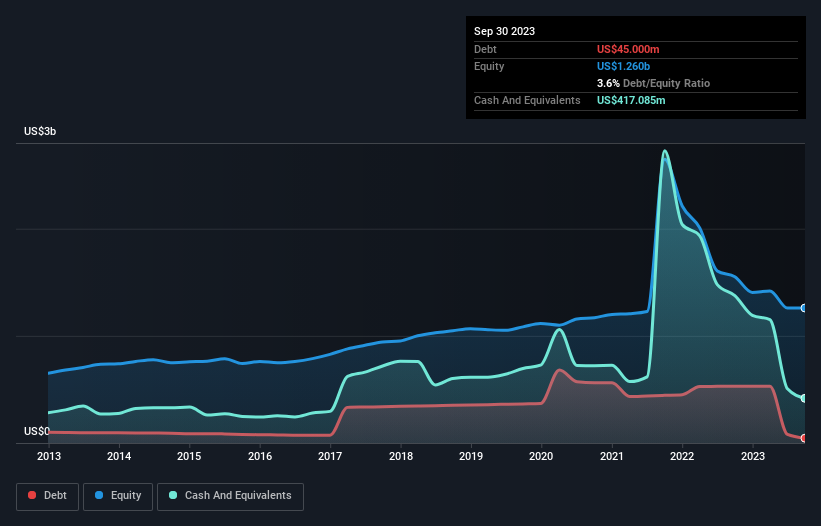Warren Buffett famously said, 'Volatility is far from synonymous with risk.' So it seems the smart money knows that debt - which is usually involved in bankruptcies - is a very important factor, when you assess how risky a company is. We can see that Silicon Laboratories Inc. (NASDAQ:SLAB) does use debt in its business. But the real question is whether this debt is making the company risky.
When Is Debt Dangerous?
Debt assists a business until the business has trouble paying it off, either with new capital or with free cash flow. Ultimately, if the company can't fulfill its legal obligations to repay debt, shareholders could walk away with nothing. While that is not too common, we often do see indebted companies permanently diluting shareholders because lenders force them to raise capital at a distressed price. By replacing dilution, though, debt can be an extremely good tool for businesses that need capital to invest in growth at high rates of return. When we think about a company's use of debt, we first look at cash and debt together.
View our latest analysis for Silicon Laboratories
What Is Silicon Laboratories's Net Debt?
As you can see below, Silicon Laboratories had US$45.0m of debt at September 2023, down from US$529.1m a year prior. But on the other hand it also has US$417.1m in cash, leading to a US$372.1m net cash position.

How Healthy Is Silicon Laboratories' Balance Sheet?
We can see from the most recent balance sheet that Silicon Laboratories had liabilities of US$165.1m falling due within a year, and liabilities of US$50.0m due beyond that. Offsetting these obligations, it had cash of US$417.1m as well as receivables valued at US$102.1m due within 12 months. So it actually has US$304.1m more liquid assets than total liabilities.
This surplus suggests that Silicon Laboratories has a conservative balance sheet, and could probably eliminate its debt without much difficulty. Succinctly put, Silicon Laboratories boasts net cash, so it's fair to say it does not have a heavy debt load!
In fact Silicon Laboratories's saving grace is its low debt levels, because its EBIT has tanked 25% in the last twelve months. When a company sees its earnings tank, it can sometimes find its relationships with its lenders turn sour. The balance sheet is clearly the area to focus on when you are analysing debt. But it is future earnings, more than anything, that will determine Silicon Laboratories's ability to maintain a healthy balance sheet going forward. So if you're focused on the future you can check out this free report showing analyst profit forecasts.
But our final consideration is also important, because a company cannot pay debt with paper profits; it needs cold hard cash. While Silicon Laboratories has net cash on its balance sheet, it's still worth taking a look at its ability to convert earnings before interest and tax (EBIT) to free cash flow, to help us understand how quickly it is building (or eroding) that cash balance. Over the last two years, Silicon Laboratories saw substantial negative free cash flow, in total. While investors are no doubt expecting a reversal of that situation in due course, it clearly does mean its use of debt is more risky.
Summing Up
While we empathize with investors who find debt concerning, you should keep in mind that Silicon Laboratories has net cash of US$372.1m, as well as more liquid assets than liabilities. So although we see some areas for improvement, we're not too worried about Silicon Laboratories's balance sheet. Over time, share prices tend to follow earnings per share, so if you're interested in Silicon Laboratories, you may well want to click here to check an interactive graph of its earnings per share history.
If you're interested in investing in businesses that can grow profits without the burden of debt, then check out this free list of growing businesses that have net cash on the balance sheet.
New: Manage All Your Stock Portfolios in One Place
We've created the ultimate portfolio companion for stock investors, and it's free.
• Connect an unlimited number of Portfolios and see your total in one currency
• Be alerted to new Warning Signs or Risks via email or mobile
• Track the Fair Value of your stocks
Have feedback on this article? Concerned about the content? Get in touch with us directly. Alternatively, email editorial-team (at) simplywallst.com.
This article by Simply Wall St is general in nature. We provide commentary based on historical data and analyst forecasts only using an unbiased methodology and our articles are not intended to be financial advice. It does not constitute a recommendation to buy or sell any stock, and does not take account of your objectives, or your financial situation. We aim to bring you long-term focused analysis driven by fundamental data. Note that our analysis may not factor in the latest price-sensitive company announcements or qualitative material. Simply Wall St has no position in any stocks mentioned.
About NasdaqGS:SLAB
Silicon Laboratories
A fabless semiconductor company, provides analog-intensive mixed-signal solutions in the United States, China, Taiwan, and internationally.
Flawless balance sheet with reasonable growth potential.
Similar Companies
Market Insights
Community Narratives



